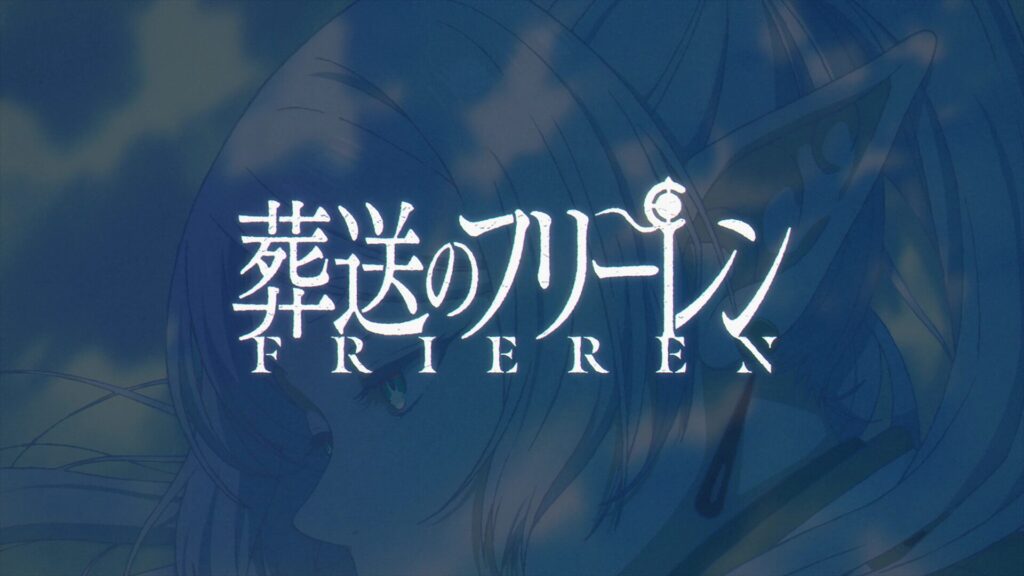
Frieren: Beyond Journey’s End』Episode 5 – Reflections from the Past : かこ(過去)からの ささやき
まものが しんだ ひとの すがたを まねて、ひとを だましていました。
A monster was imitating the dead to deceive people.
ふりーれんの まえに あらわれたのは、むかしの せんゆうに にた まぼろしでした。
Before Frieren appeared a phantom that resembled an old comrade.
ふぇるんの まえには、ししょーの はいたーが あらわれました。
Before Fern appeared her late teacher, Heiter.
ふたりは こころを ゆさぶられましたが、まものの うそを みやぶりました。
Though both were emotionally shaken, they saw through the monster’s lies.
そして ふりーれんは、まものを たおしました。
Then, Frieren defeated the monster.
そのあと、ふたりは 「しゅうげきしゃの いえ」で ひとりの せんしに であいます。
After that, they met a lone warrior at a place called the Raider’s House.
その せんしの なまえは シュタルク。
The warrior’s name was Stark.
かれは じしんが なく、こわがり ですが、ふりーれんは 「いっしょに たびを しよう」と さそいます。
Though he lacks confidence and is timid, Frieren invites him to join their journey.
🌟 Waku Waku Word Dive
まぼろし(幻) /ma.bo.ro.shi/ – Noun
Meaning: illusion; phantom
A thing that seems real but isn’t—often used in emotional or eerie contexts.
まける(負ける) /ma.ke.ru/ – Verb
Meaning: to lose; to be defeated
Often used in contrast with “かつ” (to win), also used in abstract struggles like emotions.
たおす(倒す) /ta.o.su/ – Verb
Meaning: to defeat; to knock down
A basic action verb used in fighting or overcoming obstacles.
こころ(心) /ko.ko.ro/ – Noun
Meaning: heart; mind; feelings
Common in phrases about emotions, decisions, or internal strength.
しんじる(信じる) /shin.ji.ru/ – Verb
Meaning: to believe; to trust
Often used with abstract ideas like “ゆめ” (dream), “かみ” (god), or “たましい” (soul).
さそう(誘う) /sa.so.u/ – Verb
Meaning: to invite; to ask someone to join
Used in social or story situations—like inviting someone on a journey or to a party.
💬 Quote #1 – Where Souls Rest
大陸の遥か北の果て、この世界の人々が天国と呼ぶ場所
魂の眠る地、オレオールにたどり着いた
そこは多くの魂が集まる場所で
私はかつての戦友たちと対話した
On the very northernmost end of the continent,
I arrived at the place the people of this world call Heaven.
I now know it as Aureole, the land where souls rest.
Many spirits have gathered there.
I spoke with friends whom I once fought alongside.
たいりくの はるか きたの はて、 この せかいの ひとびとが てんごく と よぶ ばしょ
たましいの ねむる ち、 おれおーる に たどりついた
そこは おおくの たましいが あつまる ばしょ で
わたしは かつての せんゆうたち と たいわ した
tairiku no haruka kita no hate, kono sekai no hitobito ga tengoku to yobu basho
tamashii no nemuru chi, Oreōru ni tadoritsuita
soko wa ōku no tamashii ga atsumaru basho de
watashi wa katsute no senyū-tachi to taiwa shita
🌟 Waku Waku Word Dive
● たいりく(大陸) /ta.i.ri.ku/ – Noun
Meaning: Continent
● はるか(遥か) /ha.ru.ka/ – Adverb
Meaning: Far away; distant in time or space
● てんごく(天国) /ten.go.ku/ – Noun
Meaning: Heaven; paradise
● たましい(魂) /ta.ma.shi.i/ – Noun
Meaning: Soul; spirit
● ねむる(眠る) /ne.mu.ru/ – Verb
Meaning: To sleep; to rest (used metaphorically for death)
● たいわ(対話) /ta.i.wa/ – Noun
Meaning: Conversation; dialogue
📘 Mini Grammar Boost
~と呼ぶ
Ex: 天国と呼ぶ場所(てんごく と よぶ ばしょ)
Tip: “Called X” – this grammar is used to describe what something is commonly named.
~にたどり着く
Ex: オレオールにたどり着いた(おれおーる に たどりついた)
Tip: “Finally reached” – implies arriving at a far or difficult destination.
かつての~
Ex: かつての戦友たち(かつての せんゆうたち)
Tip: “Former / once” – describes people or things from the past.
🔀 Slash Reading – Japanese / English
大陸(たいりく)の 遥(はる)か 北(きた)の 果(は)て、 この 世界(せかい)の 人々(ひとびと)が 天国(てんごく)と 呼(よ)ぶ 場所(ばしょ)
On the very northernmost end of the continent, I arrived at the place the people of this world call Heaven.
魂(たましい)の 眠(ねむ)る 地(ち)、 オレオールに 辿(たど)り着(つ)いた
I now know it as Aureole, the land where souls rest.
そこは 多(おお)くの 魂(たましい)が 集(あつ)まる 場所(ばしょ)で
Many spirits have gathered there.
私(わたし)は かつての 戦友(せんゆう)たちと 対話(たいわ)した
I spoke with friends whom I once fought alongside.
💬 Quote #2 – The One-Hundredth That Changed You
そんなことも言ったっけね 面白いものだな 何が? その100分の1がお前を変えたんだ
Sounds like me, I suppose. It’s funny, don’t you think? What is? How much that one one-hundredth has changed you.
そんな ことも いったっけね
おもしろい もの だな
なに が?
その ひゃくぶんのいち が おまえ を かえた んだ
sonna koto mo ittakke ne
omoshiroi mono da na
nani ga?
sono hyakubun no ichi ga omae o kaeta nda
🌟 Waku Waku Word Dive
● いったっけ(言ったっけ) /it.tak.ke/ – Verb (casual past recollection)
Meaning: I (might have) said that, didn’t I?
● おもしろい(面白い) /o.mo.shi.ro.i/ – Adjective
Meaning: Funny; interesting
● ひゃくぶんのいち(百分の一) /hya.ku.bun.no.i.chi/ – Noun
Meaning: One percent; one one-hundredth
● かえる(変える) /ka.e.ru/ – Verb
Meaning: To change; to alter
● おまえ(お前) /o.ma.e/ – Pronoun
Meaning: You (casual; often used between close friends or in a superior tone)
📘 Mini Grammar Boost
~ったっけ
Ex: 言ったっけね
Tip: Casual expression for trying to recall something – “Did I say that?”
~ものだな
Ex: 面白いものだな
Tip: Reflective tone – “That’s a strange/funny thing, isn’t it?”
~んだ
Ex: 変えたんだ
Tip: Emphasis or explanation – “(It) did change (you)”; used to give reasoning or realization
🔀 Slash Reading – Japanese / English
そんな ことも 言(い)ったっけね
Sounds like me, I suppose.
面白(おもしろ)い もの だな
It’s funny, don’t you think?
何(なに)が?
What is?
その 百分(ひゃくぶん)の一(いち)が お前(おまえ)を 変(か)えたんだ
How much that one one-hundredth has changed you.
💬 Quote #3 – Haunt Me If I’m Naughty
さもないと?死んだ後に化けて出ますハイター様、私が悪い子になれば、化けて出てきてくれるのですか?ずる賢くなりましたね。誰に似たんだか。
If I don’t, what?I’ll come back as a ghost and haunt you.So just to make certain, you’re saying that if I’m a bad girl, you’ll pay me a visit after you’re gone?You’ve grown into quite the sly young lady. Wherever did you pick that up?
さもないと?
しんだ あとに ばけて でます
はいたーさま、 わたしが わるい こに なれば、 ばけて でてきて くれるの ですか?
ずるがしこく なりましたね。 だれに にたんだか。
samo nai to?
shinda ato ni bakete demasu
Haitā-sama, watashi ga warui ko ni nareba, bakete dete kite kureru no desu ka?
zurugashikoku narimashita ne. dare ni nitan da ka.
🌟 Waku Waku Word Dive
● さもないと /sa.mo.na.i.to/ – Phrase
Meaning: Or else; otherwise
● ばけてでる(化けて出る) /ba.ke.te.de.ru/ – Verb
Meaning: To appear as a ghost; to haunt someone
● わるいこ(悪い子) /wa.ru.i.ko/ – Noun
Meaning: A bad child; a naughty kid
● くれる /ku.re.ru/ – Verb
Meaning: To do something for me (when someone else gives or acts in your favor)
● ずるがしこい /zu.ru.ga.shi.ko.i/ – Adjective
Meaning: Sly; cunning (often used playfully)
● にる(似る) /ni.ru/ – Verb
Meaning: To resemble; to look like
📘 Mini Grammar Boost
~てくれるのですか
Ex: 出てきてくれるのですか?
Tip: Asking if someone would kindly do something for you – polite nuance of receiving favor
~に似たんだか
Ex: 誰に似たんだか
Tip: Expresses ironic or playful reflection – “I wonder who you take after”
🔀 Slash Reading – Japanese / English
さもないと?
If I don’t, what?
死んだ あとに 化けて 出ます。
I’ll come back as a ghost and haunt you.
ハイター様、 私が 悪い子に なれば、 化けて 出てきて くれるのですか?
So if I’m a bad girl, you’ll come back and visit me?
ずる賢く なりましたね。 誰に 似たんだか。
You’ve become quite sly. I wonder who you got that from.
💬 Quote #4 – Not the Work of the Undead
話をまとめると死んだ身内や知り合いの幽霊が目撃されていて、どれも生前の姿のまま。話しかけられたという人もいたようですね。これはアンデッドの仕業じゃないね。
Here’s what we’ve learned.The ghosts take on the form of the beholder’s dead family member or friend.They look just as they did in life.A couple of witnesses even claim that the ghosts spoke to them.We can conclude this isn’t the work of the undead.
はなしを まとめると
しんだ みうちや しりあいの ゆうれいが もくげき されていて
どれも せいぜんの すがたの まま
はなしかけられた という ひとも いたよう ですね
これは あんでっどの しわざ じゃない ね
hanashi o matomeru to
shinda miuchi ya shiriai no yūrei ga mokugeki sarete ite
dore mo seizen no sugata no mama
hanashikakerareta to iu hito mo ita yō desu ne
kore wa andeddo no shiwaza ja nai ne
🌟 Waku Waku Word Dive
● みうち(身内) /mi.u.chi/ – Noun
Meaning: Relative; family member
● ゆうれい(幽霊) /yuu.rei/ – Noun
Meaning: Ghost; spirit of the dead
● せいぜん(生前) /sei.zen/ – Noun
Meaning: While alive; during one’s lifetime
● すがた(姿) /su.ga.ta/ – Noun
Meaning: Appearance; figure
● はなしかける(話しかける) /ha.na.shi.ka.ke.ru/ – Verb
Meaning: To speak to; to address
● あんでっど(アンデッド) /an.ded.do/ – Noun (Katakana)
Meaning: Undead; living corpse (fantasy term)
● しわざ(仕業) /shi.wa.za/ – Noun
Meaning: Deed; act (usually with a negative nuance)
📘 Mini Grammar Boost
~をまとめると
Ex: 話をまとめると
Tip: “To summarize…” – used when drawing conclusions or recapping
~という人もいたようですね
Ex: 話しかけられたという人もいたようですね
Tip: Reported hearsay + speculation – “Some people reportedly said…”
~じゃないね
Ex: これはアンデッドの仕業じゃないね
Tip: Colloquial negation – “This isn’t…”; casual tone for conclusion
🔀 Slash Reading – Japanese / English
話を まとめると、
Here’s what we’ve learned.
死んだ 身内や 知り合いの 幽霊が 目撃されていて、
Ghosts of deceased relatives or acquaintances have been sighted.
どれも 生前の 姿のまま。
They all looked exactly as they did when alive.
話しかけられた という 人も いたようですね。
Some people even said the ghosts spoke to them.
これは アンデッドの 仕業 じゃないね。
This doesn’t seem to be the work of the undead.
💬 Quote #5 – Accustomed to Begging
私は命乞いをする先生の幻影を撃ったよ。まあ先生の命乞いは聞き慣れていたから、そこまで罪悪感とかはなかったけどね。だとしても気分のいいものじゃない。命乞いを聞き慣れるってどういうことなんですか?
I once had to shoot an illusion of my master begging for her life.Though, to be fair, her begging not to die was a regular occurrence.So, I can’t say that I felt particularly guilty.Regardless, it certainly isn’t fun.Why? Were you accustomed to hearing her beg for her life?
わたしは いのちごいを する せんせいの げんえいを うった よ
まあ せんせいの いのちごいは ききなれて いたから
そこまで ざいあくかん とかは なかった けど ね
だとしても きぶんの いい もの じゃない
いのちごいを ききなれるって どういうこと なんですか
watashi wa inochigoi o suru sensei no gen’ei o utta yo
maa sensei no inochigoi wa kikinarete ita kara
sokomade zaiakukan toka wa nakatta kedo ne
da to shite mo kibun no ii mono ja nai
inochigoi o kikinareru tte dou iu koto nan desu ka
🌟 Waku Waku Word Dive
● いのちごい(命乞い) /i.no.chi.go.i/ – Noun
Meaning: Begging for one’s life
● げんえい(幻影) /gen.ei/ – Noun
Meaning: Illusion; phantom
● うつ(撃つ) /u.tsu/ – Verb
Meaning: To shoot; to fire (a weapon)
● ききなれる(聞き慣れる) /ki.ki.na.re.ru/ – Verb
Meaning: To become accustomed to hearing
● ざいあくかん(罪悪感) /zai.a.ku.kan/ – Noun
Meaning: Guilt; sense of guilt
● きぶん(気分) /ki.bun/ – Noun
Meaning: Feeling; mood
📘 Mini Grammar Boost
~を撃ったよ
Ex: 幻影を撃ったよ
Tip: Casual past form – “I shot (it)” with explanatory nuance
~から、~けどね
Ex: 聞き慣れていたから、そこまで罪悪感とかはなかったけどね
Tip: Gives a reason (から) and a soft contrast or afterthought (けどね)
~ってどういうことなんですか
Ex: 命乞いを聞き慣れるってどういうことなんですか
Tip: Casual quote marker + explanation – “What do you mean by…?”
🔀 Slash Reading – Japanese / English
私は 命乞いを する 先生の 幻影を 撃った よ。
I once had to shoot an illusion of my master begging for her life.
まあ 先生の 命乞いは 聞き慣れていた から、
To be fair, I’d gotten used to hearing her beg for her life.
そこまで 罪悪感 とかは なかった けど ね。
So I didn’t feel all that guilty about it.
だとしても 気分の いい もの じゃない。
Still, it’s not exactly pleasant.
命乞いを 聞き慣れるって どういうこと なんですか。
Why? Were you really accustomed to hearing her beg for her life?


